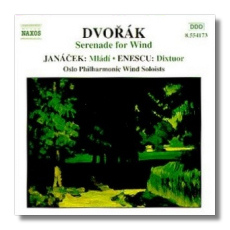
The Internet's Premier Classical Music Source
Related Links
- Latest Reviews
- More Reviews
-
By Composer
-
Collections
DVD & Blu-ray
Books
Concert Reviews
Articles/Interviews
Software
Audio
Search Amazon
Recommended Links
Site News
 CD Review
CD Review
Czech Serenades

- Antonín Dvořák: Serenade for Winds, Op. 44
- George Enescu: Dixtuor, Op. 14
- Leoš Janáček: Mladi
Oslo Philharmonic Wind Soloists
Naxos 8.554173
This is easy to write and to the point. This disc offers an hour of some of the most wonderful music, wind or otherwise, you will ever hear. The soloists come from that same orchestra that Mariss Jansons used to make one of the finest Tchaikovsky Symphony cycles ever. The Dvořák Serenade should not be confused with his Op. 11 Serenade for Winds. (In case you are a tyro seeking a second opinion on that particular work.) As is most of his work, the Dvořák is ur-Czech and written about the time of the 6th Symphony. The liner notes indicate that the Enescu will remind you more of Bach than Czech music. I don't know about that. The Janáček is typical of the composer, weird as hell. The sound is excellent, usually a trait of how Naxos captures the woodwinds to well in all their recordings, with a certain burnished feel to it. I love this disc and have played it many evenings as I read philosophy, or my latest book, Eye of the Storm *
Unfortunately, now I have to go find every other recording I can of these same pieces. Since they are probably not similarly coupled that may mean two additional purchases since I have another of the Dvořák**. I have come to the conclusion that when you first hear a piece, you don't really appreciate it until you have heard at least two recordings. Anybody got some suggestions for two recordings of Stravinsky's Symphony of Psalms?
* This book is the diary of a Union Private in the war. Robert Knox Sneden kept the diary over most of the war, including a year spent in Andersonville. He was a cartographer and also painted watercolors of events and places. The diary was not discovered until 1994 and published six years later after authentication, etc. Anyone who likes to read about the Civil War should get this book.
** That recording is with the Chamber Orchestra of Europe with Alexander Schneider conducting. Comparisons here, therefore, cannot be absolute given the inherent differences in size of players, etc. I can say that the Oslo group sounds more lively, perky if you will (Czech?) even though their timings are slower in every movement.
Copyright © 2001, Robert Stumpf II


















